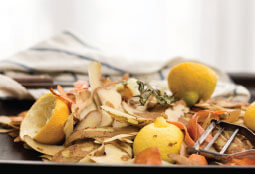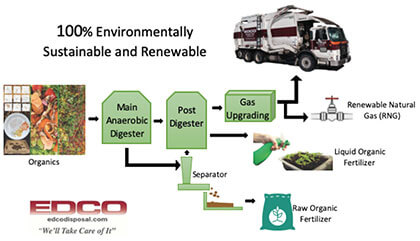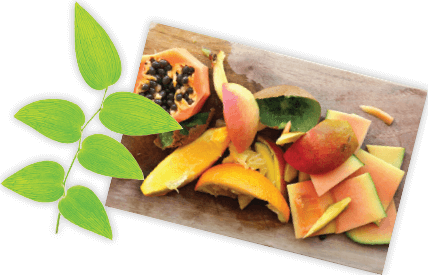Commercial Services
EDCO’s New Organics Recycling Program Collects Food Scraps and Landscape Waste Mixed Together in a Green Organics Container
Folleto de Productos Orgánicos Comerciales que Viene Pronto
Bilingual Commercial Organics Guide
| Recyclable Organics Includes | |
|
|
Place recyclable organics directly into your designated green collection container. Do not use any kind of plastic bags (including certified compostable or biodegradable bags) for any type of green waste, food waste, or other organics collection or disposal, as they contaminate the material! All organic material must be placed loosely inside the green container for collection. Paper bags are acceptable.
Please do not place any of the following materials in your designated green organics recycling container:
- No plastic bags.
- No trash or hazardous waste.
- No animal waste.
- No dirt, rocks, asphalt, concrete, sand, etc.
- No treated or lead-based painted wood or lumber.
Organic Waste

Organic waste is a renewable natural resource. It mainly comes from yard and kitchen waste from homes, food waste, and industrial and commercial operations scraps. Mandatory organic waste recycling is the next step to achieving California’s Zero Waste goals.
Recycling organics is easy and convenient with EDCO’s commingled Organics Recycling program. EDCO has expanded its source-separated green waste collection to include recycling food waste. The service will allow customers to place food scraps in the same container as green waste. EDCO’s new Organics Recycling program is a foundation for your community to achieve state mandates, including AB 1826, AB 1594, and SB 1383, which are directly related to organics recycling in California.
EDCO’s Commercial Food Waste Recycling Video
Please watch our informative video to learn more about EDCO’s new Organics Recycling Program and how it will significantly impact the future of organic waste.
Why Recycle Food Waste?

Organic waste accounts for over 40% of California’s waste stream material. Organic material cannot break down when buried in a landfill, as it would in nature or a compost pile, because it decomposes without oxygen, releasing methane gas into the atmosphere.
Organic waste is recycled into valuable compost or mulch used in an organics recycling program for soil restoration. It can also be recycled by anaerobic digestion, producing nutrient-rich biofertilizers, renewable energy, and fuel. By recycling food waste, you extend valuable landfill space, which also reduces CO2 emissions and preserves our environment!

What Will Go in the Green Cart
Below are just a few examples of what can be placed in your green organics cart.

Food Scraps
Fruit, vegetables, meat, bones, dairy, eggshells, prepared food

Food-Soiled Paper
Napkins, tea bags, paper plates, coffee filters

Yard Waste
Plants, leaves, branches, grass


What Can You Do Now?
In the United States alone, a shocking 40% of food is uneaten, wasted, and discarded. We, as consumers, are the largest producers of food waste, believe it or not, exceeding grocery stores and restaurants combined! So, the smallest changes add up and make a huge difference. San Diego Food System Alliance is leading an initiative across San Diego County to reduce food waste and increase food donations to people. By visiting their website, at sdfsa.org, customers can find information on food recovery throughout the county, food donation guides, and resources.
SB 1383 De Minimis Waivers
The City of San Diego’s Environmental Services Department (ESD) has established a process for commercial businesses that generate little to no organic waste (green bin materials) to request an SB 1383 De Minimis Waiver.
A De Minimis Waiver may be granted if:
- The commercial business’ total solid waste collection service is two (2) cubic yards or more per week, and organic waste comprises less than 20 gallons per week, or,
- The commercial business’s total solid waste collection service is less than two (2) cubic yards per week, and organic waste is less than 10 gallons per week.
Please note: businesses that require a permit from the San Diego County Department of Environmental Health and Quality – Food and Housing Division, businesses that serve food, businesses that make food, plant businesses (nurseries, landscapers, florists, cannabis), events that make and/or sell food, and multifamily properties with five units or more are ineligible for a de minimis waiver.
Please visit our Resource Center for additional information, including informative videos, recycling guides, and service brochures.
Your Service Area
You are currently viewing services for San Diego. Enter a zip code to if you want to switch to another location.